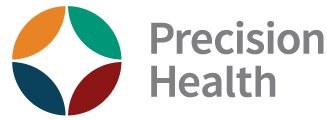Humanwide FAQs
What is Humanwide?
Humanwide is a bold pilot project showcasing how the most cutting-edge tools of modern biomedicine can be used in patient care—not only to cure disease but to predict and prevent it, as well.
In Humanwide, which spanned January to December 2018, a primary care team partnered with all patients in the pilot to create a comprehensive portrait of their health, using data from wearable devices, genetic and genomic testing, and wellness assessments. This knowledge was then used to map a custom care journey for each patient, helping the individual achieve personal goals such as losing weight, managing stress, or getting a chronic condition under control. In some cases, this also involved helping patients understand and manage health risks when they had a family history of illness or genetic propensity for a disease.
The Humanwide model applies Stanford Medicine’s Precision Health vision to a clinical setting, reimagining medicine to focus on predicting, preventing, and curing disease —precisely.
Why was the Humanwide pilot conducted?
Patients want a primary care team that knows them well, understands the nuances of their health, and is easy to reach whenever a question or concern arises. The Humanwide model was designed to meet these needs by strengthening the patient/provider relationship and leveraging the latest health technology to enhance care.
Humanwide also taps into increased awareness among patients of the many options they have to access their own health data. The pilot aimed to take advantage of these new sources of data, from mobile and at-home digital devices to genetic testing.
Finally, provider burnout is a particularly acute issue in primary care, and improvements in clinician satisfaction can have a meaningful impact on the quality of care. Humanwide’s team-based approach distributed patient care responsibilities among team members, increasing professional fulfilment and ensuring patients received the right care at the right time.
Who participated in the Humanwide pilot?
The Humanwide pilot included a diverse group of 50 patients, with a range of ages, different races/ethnicities, genders, and medical conditions.
- Patients ranged in age from 24 to 86 years old, with a median age of 47. 67% of patients were female. Half of participants were Caucasian, 27% were Asian, 19% were Hispanic, and 6% were African American.
- Over half of the participants were obese, and 58% had a major cardiovascular risk. Three patients were undergoing cancer treatment, one was awaiting a kidney transplant, and one had already undergone a kidney transplant. Three patients had severe heart disease and had undergone bypass surgery
What services did Humanwide patients receive?
As part of the pilot, Humanwide patients:
- Communicated regularly, in-person and virtually, with members of a care team consisting of a primary care physician, nutritionist, behavioral health specialist, and clinical pharmacist.
- Underwent genetic assessments and a pharmacogenomic screening, which evaluated their individual physiologic response to medications based on their genetic profile.
- Used mobile and home-based monitoring devices, including a glucometer, pedometer, scale, and blood pressure cuff, to regularly measure key health metrics. The data automatically uploaded to their electronic health records for remote monitoring by their health care team.
- Worked with a certified health coach to identify wellness goals and create a plan for achieving them.
Did patients benefit from the Humanwide approach?
At the end of the initial study period, patients had experienced meaningful improvements in their health:
- One out of two patients prevented or improved management of a chronic disease using information provided by the connected devices used through Humanwide. For example, one patient’s portable blood pressure cuff detected masked hypertension — blood pressure that is normal in the doctor’s office but elevated outside of the clinic. Masked hypertension often goes unrecognized; however, it carries a heightened risk of stroke and other cardiovascular problems. The Humanwide clinical team diagnosed the condition, and prescribed appropriate medication to help manage it.
- More than one in four patients receiving pharmacogenomic testing had a clinically-significant finding that affected medication used to treat chronic conditions. With these findings, clinicians made better-informed decisions about the drugs and dosages prescribed to these patients. For example, one patient experiencing frequent leg cramps underwent pharmacogenomic testing that revealed he is a slow metabolizer of statins, which may contribute to leg cramps. The Humanwide team adjusted his dosage, and his leg cramps abated.
- Family history and genetics screening provided as part of the pilot helped the Humanwide team better determine the risk of disease. For example, of 33 women who were screened for breast cancer risk, five were identified as having a very high risk. The Humanwide team recommended ongoing, enhanced surveillance for these women. Prior to the pilot, their risks were unknown and would not have been detected during a routine screening.
What are the implications of Humanwide?
Our early experience with Humanwide, described in the Annals of Family Medicine, shows that creating a more comprehensive, patient-centered, data-driven environment is feasible, and that both patients and health care providers are receptive to using new tools and data streams to transform primary care.
Additionally, preliminary findings indicate that the collaborative team approach to patient care, combined with more comprehensive and integrated electronic health records and increased interaction with patients, led to improved clinician satisfaction in their daily practice. Humanwide clinicians also reported that the focus on team-based care helped them feel more engaged in their work through the shared experience of caring for each patient.
What’s next for Humanwide?
Based on our preliminary findings, the methodologies utilized in the pilot project have the potential to be broadly applied in various settings.
The project also offers insights for the future use of detailed population health data to benefit individual patients.
Can I sign up to receive primary care in the Humanwide model?
Some patients receiving primary care from Stanford Medicine may be able to participate in select components of the Humanwide approach. Questions should be directed to your provider.
